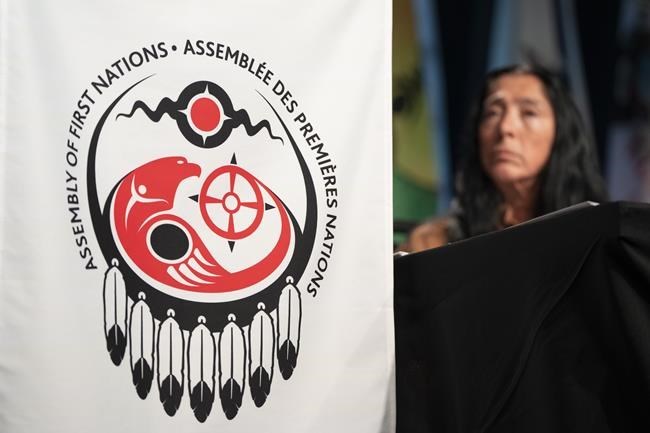OTTAWA — Hundreds of delegates listened intently Tuesday as the slate of candidates vying to take over leadership of the Assembly of First Nations pleaded their case one final time before the assembly decides their fate.
After elaborate opening ceremonies, a policy debate and a panel on the Federal Court's landmark $23-billion child-welfare settlement, the assembly gave way to an evening of vote-for-me pitches before ballots are cast Wednesday.
Each candidate was given 20 minutes to make a final presentation to assembled delegates before a question-and-answer session that was scheduled to last an hour and a half.
The candidates didn't hold back in their efforts to convince delegates to click their name during Wednesday's online voting. Several hopefuls filled the stage with prominent supporters as they took the podium.
But few outside of David Pratt and Sheila North generated much energy and sustained applause from a packed house of delegates at Ottawa's downtown convention centre.
Pratt, current vice-chief for the Federation of Sovereign Indigenous Nations, reminded delegates of the "great history" they share in their advocacy, urging them to unite in order to hold the federal government to account.
"We've got to stand together and send a message to governments across the country that enough is enough," Pratt said.
Major changes are needed in the natural resources sector, child welfare, housing and education, he said — all areas the Assembly of First Nations has a duty to play a role, but can't unless chiefs are properly empowered.
"When I’m national chief, we're going to shake this country up, and let Canada, the provinces and the territories know we’re back."
Dean Sayers, a longtime Batchewana First Nation chief, said Anishinaabe have inherent obligations dating back to when they were "lowered" into what is now known as North America.
"We are the first level of governance on these lands," which includes the protection of land, languages, peoples and ways of life, Sayers said. The Assembly of First Nations is a vehicle to do that work, and chiefs must be united, he added.
"I'm not going to sit in Ottawa — I'm not going to be here waiting for a meeting with the prime minister," he said. Instead, he promised to advocate for the chiefs themselves and act based on their needs.
North, a veteran of past AFN leadership campaigns, said she has learned a lot since she last sought the leadership post five years ago.
If elected this time, she proposed signing a treaty with First Nations from across the country to show the federal government they're united, and that they will not support legislation designed by others that doesn't work for them.
"Let's make the AFN relevant again," she pleaded.
Craig Makinaw, the former chief of Ermineskin Cree Nation and a former Alberta regional chief, said the assembly was created to ensure chiefs have a platform to advocate for First Nations.
"Our population is getting bigger, and our land base is getting smaller," Makinaw said of on-reserve housing crises that result in decades-long wait lists and homes in need of major repairs.
"We need more land — everyone needs more land."
Cindy Woodhouse, the assembly's current regional chief for Manitoba, earned a rousing cheer when she acknowledged Wab Kinew's election win in her province, becoming Canada's first-ever First Nations premier.
Woodhouse called for better First Nations policing, more communication between chiefs and the executive and more aggressive lobbying in Ottawa to ensure concerns are addressed in the next federal budget.
She also pointed to her work in securing a landmark child-welfare settlement approved by the Federal Court in October.
Reginald Bellerose, chair of the Saskatchewan Indian Gaming Authority and the Saskatchewan Indian Training Assessment Group, said he's running for the top job because of "unfinished business" — the fight for inherent rights and the recognition of treaties.
"We keep fighting for our rights," he said, "right until the day we die."
Bellerose pleaded for chiefs to come back to help do the "life and death" work of the assembly. National chief elections shouldn’t be decided by a small portion of the chiefs the assembly claims to represent, he said.
The election of the organization's next national chief comes as members look for a reset, following a turbulent period when their internal politics were as high-profile as their advocacy for some 600 First Nations.
Former national chief RoseAnne Archibald was ousted in June at a special chiefs' assembly held to address the findings of an investigation into complaints from five staff members about her conduct.
Archibald denied those allegations, and her supporters maintain she was removed from the post for trying to change the organization's status quo.
Of the 231 chiefs who took part in the special assembly, 71 per cent voted to remove her.
According to the assembly's election procedures, each member nation has one vote, which can be cast either by the chief or by a registered proxy on Wednesday.
The winner of the election is the candidate that receives more than 60 per cent of the votes.
If no candidate receives more than 60 per cent of the vote, the candidate with the lowest number of votes is eliminated and additional rounds of voting ensue.
Immediately after the election on Wednesday evening, the new national chief is expected to participate in an oath of office ceremony.
This report by The Canadian Press was first published Dec. 5, 2023.
Alessia Passafiume, The Canadian Press




